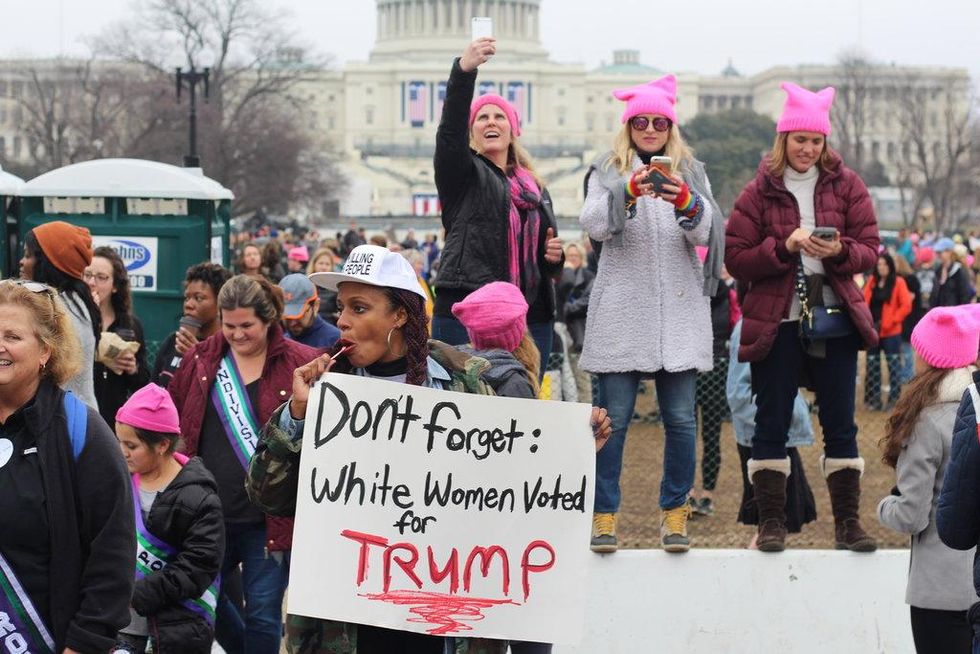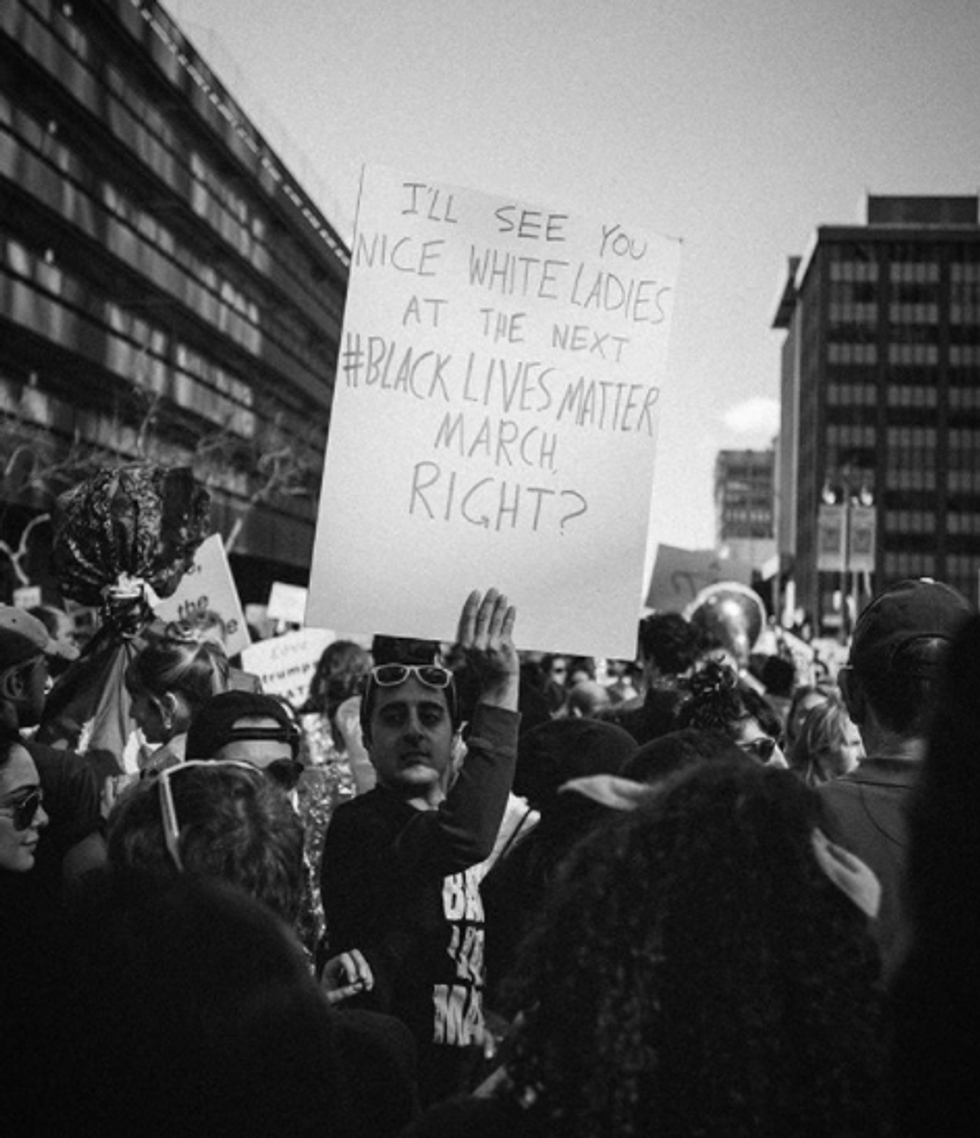Feminism is one of the most commonly debated social movements today – four waves in, the concept is nothing new, but the simple notion is far from "over" or from all genders being "equal."
While feminism is rightfully praised for allowing women to rise in society against intrinsic patriarchal influences, it's far from perfect and not above criticism. "White feminism" is a catch-all term used to address feminism that does not address the struggles of women of color and has also been expanded to include women with other marginalized identities.
The shortages in feminism extend both to all women on a basic level and in detrimental ways that keep historical oppression in place. Feminism's main detriment is that in many cases, it doesn't focus on all women and in its efforts spirals from its core goals.
One of the most basic examples of misogynistic influences arises in the "Not Like Other Girls" phenomenon. The trope, regardless of what gender it comes from, pits women against each other with the idea that certain characteristics make them "better" than another.
This is especially prevalent in slut-shaming, which utilizes misogyny to criticize women for how they present themselves and what they do and acts as an ego boost for those who criticize them. Slut-shaming most commonly deals with what someone wears and what they choose to do with others, neither of which reflect on their character as a person.
The same sentiment goes into women who are happy with or without significant others, or whether they choose to pursue work or stay at home. The criticism constantly comes back to women having a choice, regardless of what that choice is.
Even when women rise to power, society as a whole is still plagued by patriarchal influences. In Norway, where women dominate politics, the government has concerns over a specific subset of men: those who have no purpose in life or no chance of getting a job. This group is prone to backlash, especially in entitlement against marginalized groups, such as immigrants and women, despite historically holding power in society.
In targeting women, toxic masculinity, despite the gender it is instigated by, only serves to hold men above other genders. This is seen both in social practices and in subtler societal habits.
An article published by the Outline in January argued that the modern trend of having a vigorous skincare routine is overrated and feeds into women's negative body image habits. While the article is rightfully critical of linking intrinsic self-worth to capitalism, it solely focuses on actions perpetuated by women, and not men.
Women are far from the only gender that use material goods as a source of escapism but are the only one to bear the brunt of stereotypes (e.g., shopping, fashion, etc). Even in industries that are seen as more “feminine,” such as fashion, there is still a gender bias that favors men.
The issue becomes worse when we stop looking at women as one, singular group and recognize intersectional aspects that are inextricable from our identities.
The #MeToo movement, which spread virally in October 2017, highlighted the prevalence of sexual misconduct against women, especially focusing on many public figures as the perpetrators. One of the most frequently accused, film producer Harvey Weinstein, had over 80 women in the film industry make claims against him.
While Weinstein and his team generally either issued vague or no statements in response to the allegations, he did take the time to dispute claims by actress Lupita Nyong’o, who at the time was the only black woman to accuse Weinstein of sexual harassment. Weinstein was quick to refute Nyong’o’s story and argued that she invited him to see her Broadway show, placing the ball in Nyongo’s court.
While this specific instance focuses on the relationship between the victim and the accused, the #MeToo movement has also drawn criticism for its narrow goals and focus on more privileged women.
The struggles for intersectionality can be exemplified by actress Rose McGowan, who was one of the more notable figures involved in the Harvey Weinstein sexual abuse allegations. McGowan went on to champion the #MeToo movement but has been criticized as a perpetrator of white feminism.
When activist Andi Dier, the founder of Transgender Advocates for Revolution, confronted McGowan about their comments on trans women on McGowan’s book tour, McGowan called Dier a paid actor and said everyone present “failed” them in their “complicity” to defend McGowan to Dier, as well as ranting that everyone should be “grateful” for what McGowan has done for feminism.
McGowan’s stance on trans issues is further complicated by their appearance on the Love Alexi podcast, during which they appeared to come out as non-binary, stating, that they would not like to live in the “construct” and that they “don’t want to be a man or a woman, I’m not.”
Regardless of McGowan’s gender, they still fundamentally misunderstand how intersectional feminism requires women from different backgrounds to recognize their privileges and lack thereof and not exclude other marginalized groups or champion one idea of a woman.
McGowan ran into transphobic claims when commenting on Caitlyn Jenner, who, after being named one of Glamour’s Women of the Year, said in her speech that she had much to learn about being a woman, one of the things she noted being style. Jenner followed the comment by adding that “womanhood,” to her, was more than material items and that she saw herself as on a journey.
McGowan argued that Jenner had a life of “male privilege” and that women are “more than deciding what to wear.” As McGowan’s comments play off of rudimentary feminism, they ignore the fact that while Jenner transitioned late in life, she dealt with her own issues being trans that cis women would not have growing up.
McGowan also glossed over the idea that in transitioning and combating gender dysphoria, some trans people, like Jenner, do place more of an emphasis on changing their appearance in order to be truer to themselves.
McGowan’s white feminism is most illustrated in a tweet from October 2017, during which they criticized a joke made by actor James Corden and suggested, “Replace the word ‘women with the ‘n’ word. How does it feel?”
Aside from the fact that the two words cannot be compared, especially considering one is a slur with an unquantifiable amount of history behind it, McGowan’s argument erases black women, who do not have McGowan’s luxury of the idea of being either black or a woman, not both.
Lack of support for women of color in feminism is nothing new – the Black Lives Matter movement, founded by three women, has been in place since July 2013, but continues to be characterized as a violent group.
In contrast, the Women’s March, which took place in January 2017, was viewed as peaceful and was more popular among the general public, with another march taking place earlier this year.
Angela Peoples, founder of the political consulting group MsPeoples, went viral at the 2017 Women’s March for her sign that read “Don’t Forget, White Women Voted for Trump.” In a piece for the New York Times, Peoples argued that the idea that all women want the same thing from feminism is a myth and focused on the work black women have made in social justice movements.
Actor Amir Talai, who is Persian-American, also went viral for his sign that read “I’ll see you nice white ladies at the next #blacklivesmatter march right?” While Talai is not black and noted that his status as a white-passing person of color allowed him to “get away” with the sign, he cited statements by figures such as columnist Jamilah Lemieux, who supported the march but criticized the lack of support given to Black Lives Matter in the years prior, in contrast to the Women’s March, which was predominantly white.
Even and especially in marginalized spaces, proponents should be held accountable for their intersectionality. While Jenner has been a notable trans icon since she came out in 2015, she has been criticized for her generally conservative and biased views, such as when she supported Donald Trump in the 2016 election.
When Trump made a statement about Jenner being able to use the bathroom of her choice at Trump Tower, Jenner’s support ignored the treatment of everyday trans people and the administration’s stance on LGBT rights, which later resulted in multiple actions to restrict trans rights.
Feminism’s greatest weakness is that despite progress, it does not fully take other marginalized groups into account. Until we are able to recognize different privileges and experiences and open ourselves up to criticism and improvement, equality for all women and across all genders will not be reached. Pretending otherwise only perpetuates the same oppressions that said movements claim to fight against.





















